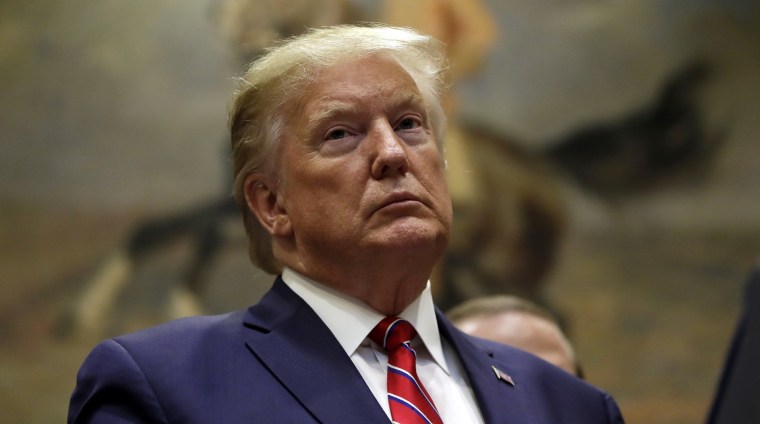WASHINGTON — Manhattan prosecutors and lawyers for a House committee urged the Supreme Court on Thursday not to block a pair of subpoenas directing President Donald Trump's accounting firm to turn over several years' worth of financial documents.
They're likely to produce the first response by the Supreme Court to the growing number of legal battles over access to Trump's financial secrets.
The Democratic majority on the House Oversight Committee issued a subpoena in April, ordering the accounting firm Mazars to turn over Trump-related financial documents covering 2011 through 2018. The committee said it acted after former Trump lawyer Michael Cohen testified that "Mr. Trump inflated his total assets when it served his purposes and deflated his assets to reduce his real estate taxes."
After lower courts rejected attempts to block the subpoena, Trump's lawyers urged the Supreme Court last week to keep it on hold while they prepare to appeal those rulings. Chief Justice John Roberts imposed a brief hold to allow lawyers on both sides to weigh in.
Trump's private lawyers contend that the House has no authority to subpoena records unless it seeks information for the purpose of writing laws. In this case, they said, the House is improperly acting as an investigative body in an action that implicates the president.
While they cast the dispute as one raising profound constitutional questions involving the separation of powers, the House said it is not seeking anything covered by official privilege or, in fact, anything directly from the president at all.
"There is no need for this court to make definitive pronouncements on the scope of Congress's power in a case in which its ruling will be so limited in application and consequence," the House said.
The House lawyers urged the court to lift the stay and let the subpoena take effect. But if the court is considering taking up the president's appeal, they urged the justices to impose an unusually fast timetable, with all legal briefs to be due by Dec. 11. If that happened, the hold on the subpoena would remain in place until the court decided whether to hear and decide the case.
The court could also simply decline to take up the president's appeal, allowing the House to enforce its subpoena.
The case is one of several legal challenges to Trump's efforts to keep his financial records hidden.
In a separate filing on Thursday, Manhattan District Attorney Cyrus Vance also urged the Supreme Court not to take up an appeal from Trump's legal team over access to his financial records.
Vance had obtained a grand jury subpoena for nearly a decade's worth of Trump's tax returns and other financial documents stemming from an investigation of hush money payments made to two women who claimed to have affairs with Mr. Trump, allegations that he has consistently denied.
The Trump legal team has argued that because a president cannot be indicted while in office, he is immune from any part of the criminal justice process, including grand jury subpoenas. During an appeals court argument last month, William Consovoy said a sitting president could not be investigated even for shooting someone on Fifth Avenue.
Lower courts rejected that argument, and the president's team urged the Supreme Court to reverse those rulings, saying that the case presents "a momentous question" about the scope of presidential immunity.
But Vance said Thursday in his court filings that the issue is much narrower and urged the justices to reject the appeal and leave the lower court rulings intact because the grand jury isn't seeking anything official at all from the president himself, only personal financial records from his accountants.
The case presents only a narrow question of whether a state can issue a subpoena to a third party -- the accountants -- when the only records sought have no relation to official actions taken by the president while in office.
"There is no real public interest at stake here at all," Vance said.

